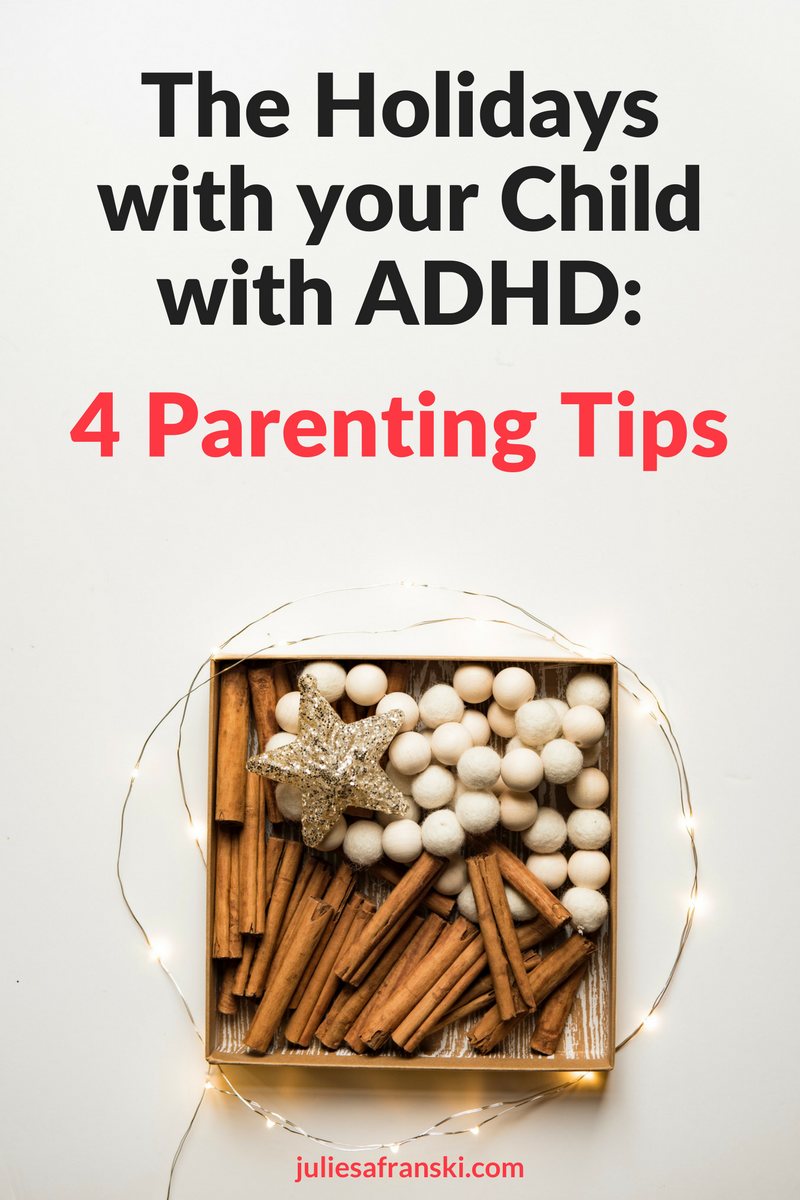Photo by Joanna Kosinska on Unsplash
With the excitement of the holiday season upon us, all kids tend to ramp up this time of year in eager anticipation. As the days get closer to winter break and the holidays that follow, kids become more excitable and even your calmest kid seems a little haywire. And if your child has ADHD (Attention Deficit/Hyperactivity Disorder), it is even more difficult for them to be able to control their impulsivity, hyperactivity, attention as well as overall emotional regulation. Here are some parenting tips that may help make the holidays a little less stressful for you and your child with ADHD.
Tip #1: Create a routine in the midst of the holiday
Kids who have ADHD need structure and holidays are the worst culprits in creating unpredictability. I have talked before about creating a routine such as when traveling. One idea is to try to keep as close to typical eating/sleeping schedules as possible. This may seem to be an inconvenience to Aunt Susie who wants to play another round of UNO with the kids instead of having them go to bed because “she never gets to see them”. But she will thank you later if you prevent a meltdown because a lot of kids with ADHD struggle with sensory processing causing these tantrum-like behaviors. Also sketching out the activities of the day and talking to your child about what is going to happen can be valuable. Also having reminders as the day goes along about activities will also help with their anxiety in anticipation of the possible fun that might happen (presents!).
Tip #2: Give your child an “out” if they seem overwhelmed
Lots of relatives talking and laughing loudly in a room compounded with the awkwardness of talking to people that they do not know, can create an overwhelming situation for your child with ADHD (or adults for that matter). Not to mention opening gifts and lots of sugar on top of an already overstimulated child. If you see that your child needs a break from the action, give them one even if they protest. Although your child may resist the break, afterwards they may appreciate being able to get some time away. They may need some calming activities of their choice; reading or drawing in a quiet room, listening to music on their headphones, watching a movie or playing a video game on his tablet. This can be done whether you are at home or away at a relative’s house. After some downtime, they may be ready to join the rest of the family again and enjoy the festivities.
Tip #3: Keep them busy but not too busy
Parents are stressed because they have so much to do to get ready for the holidays and kids often complain “I’m bored” which may lead to arguments or behavior issues. Put your child’s energy (and sometimes hyperfocus) to good use help you while also striking a balance of their own downtime alone. Whether they like wrapping gifts, making cookies or taking the dog for a walk can keep them busy and happy. Engaging them in holiday tasks gives them something to focus on and feel accomplished when finished. Also, decide which holiday events are most important to attend (e.g. ice skating with 1 close friend vs. neighbor’s holiday open house with lots of people) as not to overextend them. Too many events can overload a child with ADHD even if the activities are ones that they really would enjoy which can lead to poor behavior choices.
Tip #4: Prepping them for expectations
Holiday gatherings bring many unfamiliar social expectations for kids of all ages. Preparing for what may happen can help as well as problem-solving in advance can be useful to manage likely awkward social situations. An example is “ Grandma expects you not to be on your phone while you are at a family gathering. Can you try to keep texting to a minimum?” or “ I know your cousin Tyler usually likes to play with you but you do not always like to do the same things. Maybe you can think about how you can compromise when you both want to do different things?” Discussing these potential situations in advance can hopefully avoid altercations with relatives and hurt feelings.
Julie Safranski, LCSW is a Chicago psychotherapist and can be reached at js@juliesafranski.com.
